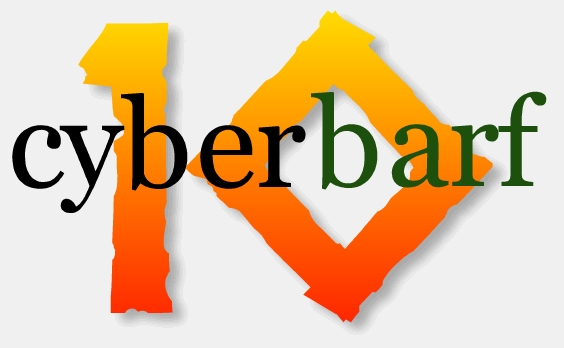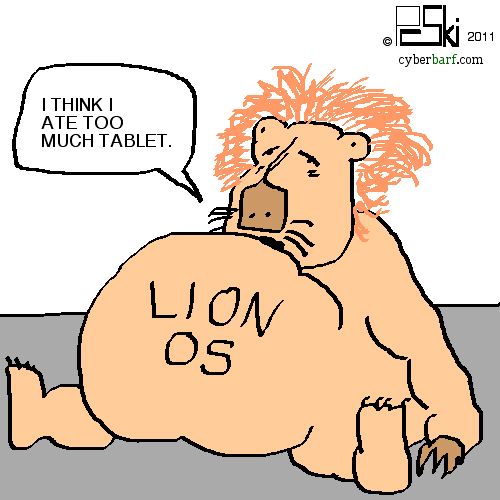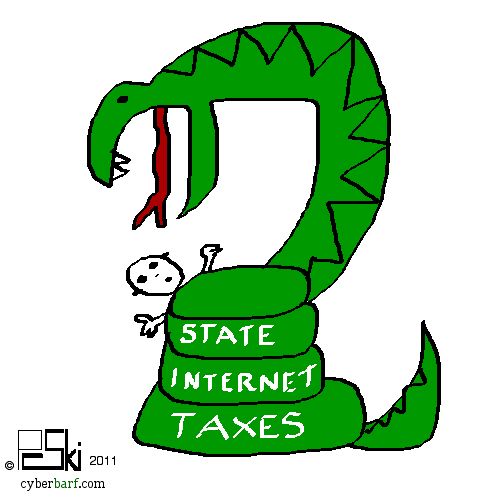|
cyberculture, commentary, cartoons, essays EXAMINE THE NET WAY OF LIFE AUGUST, 2011
IN THIS ISSUE: CYBERBARF IS 10! NEW cyberbarf KOMIX VIDEO GAME PROTECTION KILL THE MESSENGER iTOONS WHETHER REPORT |
|
|
cyberbarf CYBERBARF IS 10! E-VERSARY In the first cyberbarf issue of August, 2001, we wrote about our plans: “The religious fever surrounding the explosive growth was hailed as the greatest growth industry in history. The message was simple, the net was the answer to all ills. You had to be on the net to be a player or stay even with your competition.” The Gold Rush to have a presence in the digital world has slowed as the world wide demand for domain names has decreased over the last few years. Internet advertising has only been corralled by a few megamonopolies while the average web operator has only seen a trickle of ad dollars per year. Businesses use the net for marketing their products and communications, especially email. “The medium has turned into the cultural message. There has been a lack of general critical, cynical or tangential review of the pop culture surrounding the global informational highway. The business plan here is simple: create a new e-publication on the focus of internet culture on society.” There is no doubt that the next generation is going to be tech savvy gadget junkies. Most are addicted to their smart phones. It is no longer whether an 8 year old will have a phone, but what kind. They are more apt to spend hours on apps than reading physical books. The old media is still floundering in the new media distribution world. “In order to re-examine the popular culture of the Internet, one needs a plan. A realistic business plan. It has been more than eight months since development of this site began on notebook pages, research into web page creation, and creation of a business model. Anyone with a small amount of capital, a personal computer, a web page design program and time can create a viable web enterprise. This endeavor will be a small business enterprise of e-publishing content. ” Of all great plans, some do not turn out like one initially expects due to foreseen and/or unintended consequences. “Gad. E-publishing sites are the bottom feeders in the WWW fishbowl, right? Out of favor, maybe. ” The big bottom feeders have become the site aggregators like the Huffington Post who “repackage” other people's content as their own. Those who find their work re-published on such sites call it theft. The sites call it the freedom of the Internet The problem is that the net is a monster that needs to be fed with new content constantly. That is why jackass videos on YouTube are so popular; anyone can upload anything dumb and become a daily star. “A basic tenet of the American dream is the opportunity to do something you enjoy, and profit from that commitment. In this situation, creating a content driven web site in an environment of dropping web advertising dollars and venture capital could be called dumb. But if one puts this in perspective, and don’t quit your day job, there is a reasonable opportunity to succeed. There are numerous stories of enterprising individuals devoting their small resources to a content page, nurturing it, and hitting a profitable take-off point of success. That is the goal for cyberbarf.com. ” Most of the displaced journalists, photographers, writers or middle managers in corporate America have used web sites and blogging as a means to keep busy, to fill a hole in the resume between real paying jobs. Some have been caught in the trap of being nonpaid contributors to aggregate sites like unpaid interns. Others who use the net to talk about their passions are the new digital hobbyists who instead of creating a local gardening club, disburse their gardening tips via a web page. Because of the lack of true verification of net readership (circulation figures can be juiced by mirrored sites, bot clicks and statistical manipulations), no one truly knows whether anyone is really making any real money in purely Internet enterprises. In some ways, the Net may be like the airline industry, which throughout its entire history, has never made a total profit. “The content, essays and political cartoons will come from the Creator. Not from a religious revelation, but from self-produced content. I am an independent writer and cartoonist. I have had experience writing and researching opinion pieces and publishing a self-produced “zine” before the term was popularly coined. It real cost is time to create the stories or cartoons based upon personal experience and observation. This principle is a standard for most web page site creators. The ease of uploading simple pages is part of the story behind the rapid growth of this interpersonal publishing media. This site will begin slowly, probably as a monthly publication, and work toward weekly editions as time warrants. ” Time is a finite beast. And this publication grand plan for a weekly edition never came to the forefront. The monthly publication schedule seemed to fit with the other sites and real work loads. There was a time to abandon the e-zine home page format and push the publication toward a full blogger page that could be updated on the whim. But that would succumb to the core values learned from creating actual newspapers in a journalism setting. Bloggers tend to be spur of the moment reactionary tidbits rather than more organized posts. We wanted to preserve at least the ghost of articles more than 140 characters in length. “ A social experiment on whether you can create a topical publication in the electronic community. We will see whether the real world timeline of profitability has a parallel to the cyberworld.” Like 99 percent of all Internet endeavors, there has been no profitability. Small revenue sources such as hit-and-miss t-shirt sales does not cover the costs of annual overhead. For years we were to sign up for an ad affiliate program with Yahoo or Google, but never got around to signing up. Some bloggers even lament today that the affiliate concept makes very little sense. A California writer lamented that her Amazon link only paid her a mere twenty bucks when it canceled its agreement when the state demanded it collect Internet sales taxes. We know the feeling. But we continued to soldier on publishing a monthly e-magazine on the examination of the Net Way of Life. In all the years, we have only missed one deadline upload by a mere two days. And during the course of these months and years, there has been a steady readership based upon the host stat monitors, around 3,000 unique users per month. Some months spiked to much higher numbers, but the core is steady. The late writer George Plimpton remarked decades ago, long before the Internet, that he would have been satisfied with a literary journal that had a subscription base of 3,000. Today, with the fleeting attention spans of surfers, a YouTube video needs 100,000 views in order to begin to get noticed in the general public. The Net has been a grand social experiment. In ten years, we have seen the rise and fall of the Home Page. Digital publications have gone through the transformation into blogs, then to podcasts, to tweets, then to abbreviated text messages. Likewise, the attention span of the average viewer appears to get smaller and smaller as well. Will the pendulum swing back to a more in-depth discussion of world events in real time? We will find out in the next ten years. cyberbarf VIDEO GAME PROTECTION ARTICLE In one of its final decisions of the last term, the U.S. Supreme Court ruled in a 7-2 decision that California's ban on the sale of violent video games to minors was unconstitutional. The majority of justices held that video games are protected by the First Amendment that provides no government intrusion into free speech, including art. Video games have been ruled to be protected art forms. On one hand, the decision affirms the right of individuals to create all forms of expression without government interference or regulation. On the other hand, it leaves the country with a strange divide between content directed at minors - - - that sexual content is still prohibited in many areas, including television with FCC regulations. One of the linchpins of the decision was that the academic and scientific studies claiming that violent video games leads to violence in children in real life were debunked as being worthless. Cartoon violence studies were the basis for the FCC to begin to regulate the hours of “adult” programming on the broadcast networks. Local news reports are filled with graphic violence, shootings, murders, gang beatings, almost on a daily basis in urban areas. We live in a violent society, and the entertainment reflects (but at times expands) our times. The real unpublished part of the court opinion is simple common sense. It is not California or the courts duty to supervise what children see or do in their childhood. It is the parents' responsibility to raise their children. It is the parents responsibility to determine what their children will be exposed to, whether it is on television, in theaters, in video games or even in school curriculums. Libertarians would call government action in parenting decisions “The Nanny State.” Americans civil liberties have been constantly eroded by government action and regulation. In the last decade, those individual rights have been taken away at a faster pace, under the reasoning that it is protect the public against terrorism or to protect children. You were supposed to be innocent until proven guilty. You were supposed to be free from unwarranted searches or seizures by government officials. In less than 30 years, we have gone from being able to take and greet family members at an airport terminal gate to being strip searched before entering the concourse. And that procedure did not stop a man from using old boarding passes and different ID to fly around the United States. Parents grew up without being placed in car seats; but now they are subject to huge criminal penalties if they do not use car seats for their own children. In certain respects, discretionary parts of parenting has been criminalized for the alleged greater good. Some would consider the government intrusion into child rearing as the nationalization of parenting. That puts subjective legislative or regulator's personal principles and bias against the parents beliefs and personal rules for raising their own children. The state may wish to protect children as wards from bad parents, but the swath of government might takes down or conflicts with good parents, too. There is no provision in the constitution that requires the state to feed, clothe, educate, or give shelter to any person's child. It was solely the parents responsibility to take care of their own children. Hillary Clinton once said “It takes a village to raise a child.” That is more a core socialist concept than the independent freedom embodied by the founders of the United States. Benjamin Franklin believed that the if society had ills, such as poverty or lack of education, it would be the private sector that would take care of their own community. He acted upon what he believed were problems in his local town, by creating the first charities, libraries and schools. Parents set forth and taught their own morals, work ethic and community principles to their children. In certain respects, with the state run schools with their increasing poor test scores, security issues and fiscal irresponsibility's, have led to the renaissance of parents taking back control of teaching their children by home schooling. The lesson to be learned from the court is a more broad return to the nation's roots: parenting should be left to the parents and not to some state regulator. cyberbarf KILL THE MESSENGER ESSAY Our thesis has been that every story from the old television series Max Headroom has come true. Max Headroom was a futuristic post-techno boom outland series. In one episode, a sinister corporation called Security Systems attempted to control all the world's information, then manipulated the data in order to crush its enemies. Today's modern equivalent of this story is the UK's newspaper phone hacking allegations. Rupert Murdoch's News of the World tabloid was alleged to have had hacked the cellphones of celebrities and crime victims in order to bolster their news stories. In one case, it deleted voice messages on a young murdered teen's phone to make it look to her parents that she was still alive. It was a clear abuse of privacy and manipulation of information to draw out a reaction and dramatic headlines. The British government was appalled by the brash hacking by reporters. Politicians used to fear the tabloid press because of their power to make or break their careers. But they pounced on this scandal with the fever of starving jackals on an easy meal. But the newspaper conduct and the world media getting its pound of flesh against the conservative Murdoch media empire masked the real scandal: the reporters alleged received the cell phone account information from bribes to Scotland Yard police officers. If true, then the police were the unprofessional means to the invasion of privacy throughout Britain. Those who were sworn to uphold the law, were actually co-conspirators in breaking it. It is quite troublesome on who one can trust in a troublesome world. In the United States, people who talk on their cellphones in public or use open Wi-Fi connections do not realize that the courts have ruled that they have “limited expectation of privacy” in their conversations. Eventhough there are eavesdropping statutes and wire tap warrant rules, the information out in the airwaves that can be captured by anyone (GPS signals, cell phone tower location information, actual calls, data messages, phone numbers) including law enforcement, can be considered fair game. Google's street view crews got into trouble by roaming the streets (especially in Europe) and using their computer software began to hack the ID passwords and codes of personal wi-fi home networks. The real intrusion into the home space with a program to extract information from a person's computer or router went beyond a random link in the public airwaves. It was an intentional hacking incident according to European officials. Companies like Google can use any bits of information to data mine a person. To do an electronic autopsy of their hardware, software, codes, buying habits, credit card charges, web log histories, a company can package and resell the information to marketers and spammers. A large portion of the Internet economy is based upon the acquisition and sale of personal computer information. And most information has come from nefarious means: from the hidden cookies in your web browsers, to dangerous links in email copy, to spyware roaming sites like spiders waiting for traffic to seize in its web. The Murdoch scandal puts the spot light on the elements of our digital age: ** Information is a commodity to be bought and sold like any other good of value. ** People have little control of their own personal information once it is told to another person or company. ** Privacy is an illusion in a world of self-exposure on social media, flicker, smartphone cams, security cams and web casts. ** Journalism as criminal behavior in desperate times when the media is dying and message is survival of the fittest. ** Hackers are on the payroll of multinational companies for various reasons, including countersecurity and data mining.
|
|
THE PINDERMEDIA STORE IS FULL OF FUN TEE-SHIRTS AND SELECTIONS. FUN . . . . VALUE . . .. FUN . . . . VALUE!
SUPPORT cyberbarf VISIT THE CYBERBARF STORE! |
|
cyberbarf EXAMINE THE NET WAY OF LIFE |
The majority of believers have belief without understanding. Mick Jagger |
|
cyberbarf
THE STEAM PUNK SPECIAL EDITION featured new Music from Chicago Ski & the (audio) Real News: (mp3/4:14 length)
EXAMINING THE NET WAY OF LIFE cyberbarf™ distributed by pindermedia.com, inc. |
CHECK OUT THE NEW REAL NEWS KOMIX REGAL SKY A MODERN WOMAN'S TAKE ON HER LIFE @ FEATURING: THE REAL NEWS IMPACT EDITORIAL CARTOONS WRIGLEYVILLE WAR POLITICS ENDORPHIN RUSH THE DARK ABYSS RANDOM ELECTRONS SPECIALS
FEATURING: THE REAL NEWS ARCHIVES CARTOONS MADAME'S TEA HOUSE THE BAR EXPLORE THE CITY SCAPE UNDER CONSTRUCTION SURPRISES ESTORE SPECIALS
|
|
iToons
|
cyberbarf
THE WHETHER REPORT
cyberbarf
STATUS
Question: Whether the rush to put all new software and data into cloud servers created more massive security breaches in the near future? * Educated Guess
* Possible
* Probable
* Beyond a Reasonable Doubt
* Doubtful
* Vapor Dream
Question: Whether government and private security firms be able to crack down and stop hacker communities that have recently increased their attacks in public proclamations? * Educated Guess
* Possible
* Probable
* Beyond a Reasonable Doubt
* Doubtful
* Vapor Dream
Question: Whether the decrease in 3D movie box office sales during the first half of the year is an omen that the 3D movie fad has peaked? * Educated Guess
* Possible
* Probable
* Beyond a Reasonable Doubt
* Doubtful
* Vapor Dream
REWIND
LOST
AFTER
A
FULL YEAR
ON
LOSTHEORY
cyberbarf
Distribution ©2001-2011 pindermedia.com, inc.
All Ski graphics, designs, cartoons and images copyrighted.
All Rights Reserved Worldwide.






















